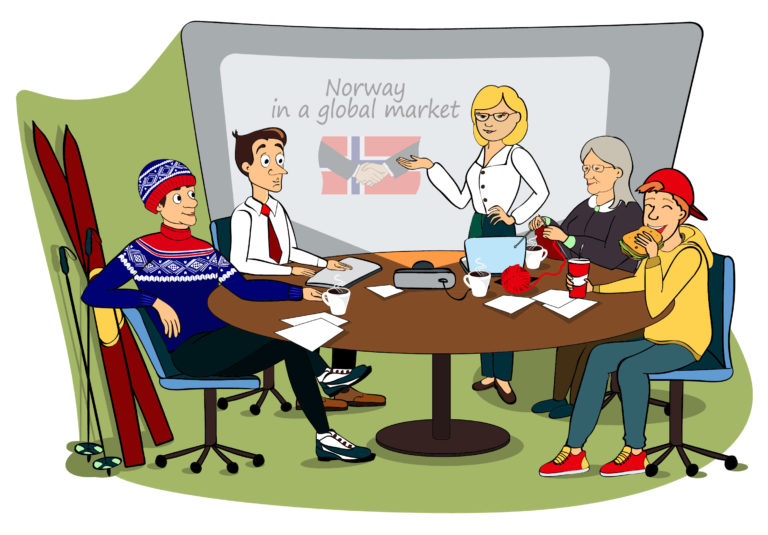
Working with Norwegians by Karin Ellis
Norwegians and Ukrainians get on very well and share many interests and beliefs. It is therefore a common mistake to assume that the Norwegian and Ukrainian business cultures are very similar. However, Norwegian workplaces are driven by a set of rules which are very different from most other business cultures, and this may lead to confusion and misunderstandings.
I would like to share some of the highlights from the book Working with Norwegians in this article. The book is the only one in the market which explains the code of conduct and unwritten rules in Norwegian workplaces. This is the guide that explains in a clear and accessible way why Norwegians think and act as they do and what they expect.
The informal style and less emphasis on hierarchy in Norwegian organizations are among the obvious traits of the workplace culture. But the differences extend to far more than that.
Trust
Trust has been an inherent part of the Norwegian culture, and research done by European Social Survey shows that Norwegians are among the most trusting people in the world. Norwegians tend to trust everyone until the opposite has been proven, which is unlike most other cultures. Examples are that Norwegians will work just as hard whether the boss is present or not and will not hesitate to leave work before the boss.There is less emphasis on how many hours are spent at work than getting the job done. The high level of trust is strongly linked to the freedom covered in the next paragraph.
‘Frihet under ansvar’ – with freedom comes responsibility
In Norway employees and students are given a lot of freedom in their daily work. This freedom is linked to a fundamental and important unwritten rule called ‘Frihet under ansvar’, which means that behind the underlying freedom and trust there is an expectation that everyone should actively take responsibility for their tasks without being supervised or followed up. Many Norwegians leave work early, but they compensate for this by starting work early, and many put in extra hours from home.

Lack of clarity
Handing out direct orders by telling people what to do is not the style in Norway. Norwegian leaders will typically focus on what to do and leave it up to their subordinates to figure out how to do the details. There is often a lack of clarity in the workplace, where the employees are expected to work relatively autonomously without being told exactly what to do. Ukrainians may feel that there is a lack of clear instructions and specifications from their Norwegian counterparts. This can lead to confusion, misunderstandings and frustration. As an example is when Norwegians say: “Can you take a look at this?” it means that a task has been delegated and one has to figure out what to do and then do it.
Indirect
Most Norwegians will give negative feedback in a more indirect way by saying something positive before delivering the negative part. This can often be misinterpreted as positive feedback by Ukrainians. There is also a tendency to ask people to do something in more indirect way, ref. the example above.
Consensus orientated
The decision making process may take a long time due to the consensus-oriented style. Norwegian leaders prefer to listen to all involved parties before making a decision, and for important decisions there will usually be several rounds of discussions. The lack of ability to make quick decisions can be frustrating for Ukrainians.
Practical tips
- Norwegians are punctual, and you should turn up on time or 5 minutes early. If you are more than 5, or maximum 10 minutes late for an activity it is expected that you inform them of the delay. You should also practice this when socialising with Norwegians.
- Norway is a very egalitarian society and people who are lower than you in the hierarchy should also be treated with the same amount respect as everyone else.
- Most Norwegians will do very little follow up and will expect people to work quite autonomously. If they do not hear from you, they will think that everything is on track. If you have any problems or delays in your work it is your responsibility to address the issue as soon as possible.
- Honesty is highly valued and you should avoid pretending to know things you do not know anything about.
- Meetings are often held without a clear agenda and minutes of meeting. If the meeting is important to your work, you could volunteer to write the minutes, or you should at least make your own notes.
- Negative feedback from Norwegians is a bit like a bitter pill in a sugar coating. The negative part is usually delivered after one or several positive statements. It is important to bear this in mind, both when you receive feedback and when you give feedback to Norwegians.
If you want to learn more you can read the book Working with Norwegians.
The book gives practical tips on how to deal with the challenges of working with or doing business with Norwegians. It also reflects upon social norms and values and what is considered acceptable behaviour in Norway. There is a section of real life exercises with solutions and explanations, several quizzes to test the cultural understanding as well as a part dedicated to socializing with Norwegians. After reading the book cooperation with Norwegians should be more predictable, and misunderstandings and frustration may be avoided.
About the author
Karin Ellis is an IT engineer with 30 years of professional experience and 20 years of leadership experience with large international companies. She is the founder of Ellis Culture and has for almost a decade developed and conducted intercultural courses, among them Working with Norwegians and Working with Ukrainians. Her courses have been conducted for thousands of people all over the world.
The book is also available in Norwegian language under the title Kunsten å arbeide med nordmenn




